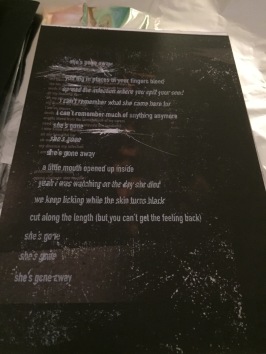With the year coming to a close I figured the Trent Reznor/Atticus Ross camp was going to hold off on new Nine Inch Nails until after the New Year. I’d been satisfied with the ‘Before the Flood’ soundtrack, but new music with little notice is always a perk worth the excitement. Not the Actual Events is a five track EP that explores solid walls of distorted sound. Over the years I’ve come to develop certain expectations of Reznor and his work, but what makes this record special is that where it doesn’t deviate, it exceeds. Old tendencies are coupled with fresh ideas, and the resulting record feels like something that would’ve been produced in the 90’s, without sounding dated. The word ‘thick’ kept coming to mind as I listened through it. Thick beats, dirty bass, and layers upon layers of oppressive noise.
In terms of songwriting and production it’s a complete departure from the 2013 release, Hesitation Marks. It’s full of screeching, distorted, atmospheric guitars, scattered throughout the EP. The use of guitars and bass with this approach to production is more in line with rock, but the result is less polished than previous rock records. It’s not pop, and doesn’t have anything that would appeal to mainstream rock radio, which is why it’s sure to please the diehards. There’s a lot of moving action and sequencing, the sort of thing that merits multiple listens.
As a drummer I’m always fascinated by the variation of drums, and Not the Actual Events delivers in that category. Electronic drums are sequenced through songs like Dear World, while the booming roomy sound of She_s Gone Away are a quick disconnect from the previous track. These changing elements keep the movements fresh, which is common with NIN, but worth the observation here.
Certain parts of the record reminded me of The Dillinger Escape Plan. Specifically the vocal inflection during the chorus of Branches_Bones, and the rhythmic procession of The Idea of You, stood out as things I’d expect from Dillinger. Not a criticism, just something I noticed.
While the wall of sound is what got to me through my first couple of spins, I came to find my attention drawn towards the vocal production. Throughout the record the vocals are mixed in such a way to obscure what’s being said, which may frustrate the casual fan, but I find it to be part of the charm. In other places the voice is loud and clear. The theme of balancing nihilism with passion reveals an individual who is uncertain, and often-in denial.
Overall Not the Actual Events is an experience that can’t be disproven. It’s short, bitter, and made of all the pieces/parts of a great Nine Inch Nails record.

UPDATE: 03/06/17
When I initially purchased the mp3s it included a “physical component” to be mailed at a later date. It was something to hold in your hands, and seemed like a nod to our collective nostalgia. After a few weeks I sort of forgot about it, until it arrived at my door, and made me excited to listen to the EP again.

A caulk like-charcoal dusting had blackened my fingertips right out of the plastic. It contained a transparent piece of film with an image of Trent/Atticus. Then a paper slide for each track with lyrics. The backs had more of the charcoal residue textured to an aesthetic visual, and came up/smeared with a touch. Most interesting (to me) was that the page with the lyrics for “she’s_gone_away” had the lyrics to their 1994 track “reptile” squeezed in between the lines, which suggests some kind of narrative connection.











